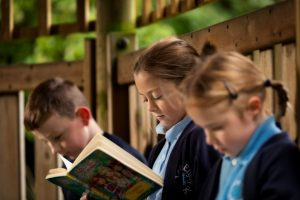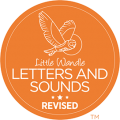Phonics and Reading
At Commonswood Primary & Nursery School, we recognise the fundamental importance of reading for a child’s academic achievement, access to the curriculum, wellbeing and success later in life. We prioritise reading, the importance of language and vocabulary and the love of stories and books in our school. It is our mission to ensure that every child at Commonswood becomes a fluent and successful reader.

Teaching children to read requires two different approaches;
- language comprehension and composition
- decoding and encoding
Language comprehension is taught through the high-quality texts, stories and poetry that we provide, combined with our language rich curriculum that promotes reading for pleasure.
What is phonics?
Making connections between the sounds of our spoken words (phonemes) and the letters that are used to write them down (graphemes).
Decoding and encoding is taught through our systematic synthetic Phonics (SSP) programme – Little Wandle Letters and Sounds (revised)
 |
Little Wandle Letters and sounds follows a clear progression from Reception to Year 1 which enables the children to build on their growing knowledge of the alphabetic code, mastering phonics to read and spell fluently and accurately. |
How we teach Phonics
Nursery
Children focus on language development through quality stories and rhymes in addition to oral blending. This is supported by the ‘Foundations for Phonics guidance’ in Little Wandle progression. Phonics is taught daily.
Reception and Year 1
Children follow the progression within the Little Wandle Letters and Sounds Revised Programme. Phonics is taught daily with a review session each week.
Pronunciation of sounds
It is essential that children are taught and modelled the correct pronunciation of phonemes in order for them to blend words for reading and segment them for spelling. See below:
Information for Parents
Reading
Reading at home is one of the most important things you can do to support your child. At Commonswood, we run workshops to assist parents in supporting their child at home. Reading has always been an important skill. In our modern world it is more important than ever. Reading with your child at home will help your child in all learning areas of school.
Children see you reading and writing in everyday life – reading for pleasure, sharing a story with your child, using a recipe, making a shopping list, writing a birthday card or reading street signs. This teaches them that reading and writing are useful skills in today’s world.
At Commonswood School, we teach reading in a variety of engaging ways. In every year group, the children are given multiple opportunities throughout the week to listen to and enjoy reading fiction and non-fiction texts. We work very hard to ensure each and every child leaves primary school with a great love of reading and strong reading skills.
In the early years, children are exposed to books and print all throughout the classroom and have daily opportunities to listen to stories, explore books and nursery rhymes during group reading and to learn to read as they develop their phonics skills and knowledge.
In Key Stage 1, as their phonics skills become more secure, children are asked to read daily at home to a parent or carer as part of their home learning. All children take part in a daily carousel of reading activities designed to secure their phonics knowledge and comprehension skills and are given multiple opportunities to read with the class teacher or teaching assistant.
In Key Stage 2, reading lessons focus more on comprehension skills in preparation for SATS at the end of Year 6. The children are still asked to read daily at home as part of their home learning and continue to have frequent opportunities to work with their teachers and teaching assistants at school to further develop their reading skills.
We know that reading at home is a crucial part of children’s ability and engagement in reading. Each week we share the reading focus for home learning to guide parents in supporting their children at home
Book Banding
Like most primary schools, at Commonswood School, we use book banding to ensure that children learn to read at their own pace and that they remain engaged and challenged throughout the process of learning to read.
Book banding is used to track a child’s progression in reading independently. The class teacher assesses which book band your child needs to access. Children are not expected to read all books in the band however, the banding helps them to select a book withing the right level of challenge. Children are sent home with books that they can comfortably read for pleasure. At school they are taught using higher levels of reading material to support reading progression. Once your child is deemed to be fluent and have sufficient comprehension skills using a particular book band, the teacher will assess whether they are ready to be moved up to the next book band.
A reminder: while your child may seem to find a certain book band easy in terms of the word reading (decoding) skills it demands, their comprehension skills may still need developing at that level and therefore the class teacher may wait to move them up
How you can help
The single most important thing you can do to help your child progress in their word reading and comprehension skills, and develop a life-long love of reading, is to read fiction and non-fiction books to them as often as possible. A bedtime story routine isn’t just a nightly calming technique; it also gives them an excellent opportunity to look at possibly new words and sentences with your support, develop their questioning and comprehension skills and spark their imaginations. Any spare moments you find to read to your children is time well spent investing in their academic achievements.
Recommended Texts
| Nursery | |
| Where’s Spot? | Eric Hill |
| Dear Zoo | Rod Campbell |
| You Choose | Pippa Goodhart and Nick Sharratt |
| We’re Going on a Bear Hunt | Michael Rosen |
| The Very Hungry Caterpillar | Eric Carle |
| Each Peach Pear Plum | Allan and Janet Ahlberg |
| The Train Ride | June Crebbin |
| Ten Little Fingers and Ten Little Toes | Mem Fox |
| Peace at Last | Jill Murphy |
| What the Ladybird Heard | Julia Donaldson and Lydia Monks |
| Reception | |
| Owl Babies | Martin Waddell |
| The Gruffalo | Julia Donaldson |
| Handa’s Surprise | Eileen Browne |
| Farmer Duck | Martin Waddell |
| Goodnight Moon | Margaret Wise Brown |
| Dogger | Shirley Hughes |
| The Snowman | Raymond Briggs |
| Where the Wild Things Are | Maurice Sendak |
| I Want My Hat Back | Jon Klassen |
| The Cat in the Hat | Dr Seuss |
| Year 1 | |
| The Tiger Who Came to Tea | Judith Kerr |
| Lost & Found | Oliver Jeffers |
| Beegu | Alexis Deacon |
| Elmer | David McKee |
| Alligator Pie | Dennis Lee |
| Corduroy | Don Freeman |
| Oi Frog | Kes Gray and Jim Field |
| The Lion Inside | Rachel Bright and Jim Field |
| Stellaluna | Janell Cannon |
| The Jolly Postman or Other People’s Letters | Allan and Janet Ahlberg |
| Year 2 | |
| Traction Man is Here | Mini Grey |
| Meerkat Mail | Emily Gravett |
| Amazing Grace | Mary Hoffman |
| The Owl Who Was Afraid of the Dark | Jill Tomlinson |
| Flat Stanley | Jeff Brown |
| Not Now Bernard | David McKee |
| Gorilla | Anthony Brown |
| Don’t Look in This Book | Samuel Langley-Swain |
| The Legend of Spud Murphy | Eoin Colfer |
| The Day the Crayons Quit | Drew Daywalt |
| Year 3 | |
| The Iron Man | Ted Hughes |
| Journey to the River Sea | Eva Ibbotson |
| The Sheep-Pig | Dick King-Smith |
| Diary of a Wimpy Kid | Jeff Kinney |
| The BFG | Roald Dahl |
| Pippi Longstocking | Astrid Lindgren |
| Winnie the Pooh | A.A. Milne |
| Charlotte’s Web | E.B. White |
| The Worst Witch | Jill Murphy |
| Year 4 | |
| Bill’s New Frock | Anne Fine |
| The Firework-Maker’s Daughter | Phillip Pullman |
| The Scarecrow and His Servant | Phillip Pullman |
| Why the Whales Came | Michael Morpurgo |
| The Lion, the Witch and the Wardrobe | C.S. Lewis |
| Voices in the Park | Anthony Browne |
| Varjak Paw | S.F. Said |
| The Children of Green Knowe | Lucy M. Boston |
| How to Train Your Dragon | Cressida Cowell |
| Desirable | Frank Cottrell Boyce |
| Year 5 | |
| Tom’s Midnight Garden | Phillipa Pearce |
| The Wolves of Willoughby Chase | Joan Aiken |
| Heidi | Johanna Spyri |
| Artemis Fowl | Eoin Colfer |
| The Breadwinner | Deborah Ellis |
| Harry Potter and the Philosopher’s Stone | J.K. Rowling |
| The Borrowers | Mary Norton |
| Emil and the Detectives | Erich Kastner |
| Holes | Louis Sachar |
| The Ghost of Thomas Kempe | Penelope Lively |
| Year 6 | |
| Clockwork | Phillip Pullman |
| The Hobbit | J.R.R. Tolkien |
| Skellig | David Almond |
| The Arrival | Shaun Tan |
| A Monster Calls | Patrick Ness |
| Carrie’s War | Nina Bawden |
| Matilda | Roald Dahl |
| Private Peaceful | Michael Morpurgo |
| Wonder | R.J. Palacio |
| Once | Morris Gleitzman |

